|
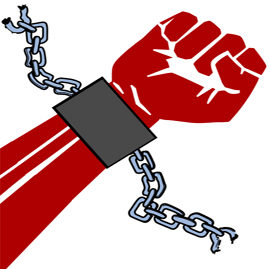 |
CRY FREEDOM.net
formerly known as
Womens Liberation Front
MORE INSIGHT MORE LIFE
Welcome to cryfreedom.net, formerly known as.Womens
formerly known as
Women's Liberation Front
MORE INSIGHT MORE LIFE
Welcome to cryfreedom.net,
formerly known as Womens
Liberation Front.
A website
that hopes to draw and keeps your attention for both the global 21th. century 3rd. feminist revolution as well
as especially for the Zan, Zendegi, Azadi uprising in Iran and the
struggles of our sisters in other parts of the Middle East. This online magazine
that started December 2019 will
be published every week. Thank you for your time and interest.
Gino d'Artali
indept investigative
journalist
radical feminist and womens' rights activist
|
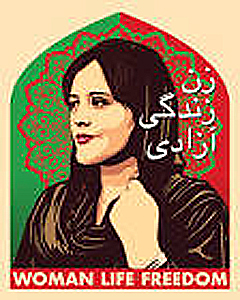 |
|
CLICK HERE ON HOW TO READ
ALL ON THIS PAGE
When one hurts or kills a women
one hurts or kills hummanity and is an antrocitie.
Gino d'Artali
and: My mother (1931-1997) always said to me <Mi figlio, non esistono
notizie <vecchie> perche puoi imparare qualcosa da qualsiasi notizia.>
Translated: <My son, there is no such thing as so called 'old' news
because you can learn something from any news.>
Gianna d'Artali.


JINA MAHSA AMINI
The face of Iran's protests. Her life, her dreams
and her death.
In memory of Jina 'Mahsa' Amini, the cornerstone of the 'Zan.
Zendagi. Azadi revolution.
16 February 2023 | By Gino d'Artali
And also
Read all about the assasination of the 22 year young Jhina Mahsa
Amini or Zhina Mahsa Amini (Kurdistan-Iran) and the start of the Zan,
Zendagi, Azadi (Women, life, freedom) revolution in Iran
2022
and the latest news about the 'Women Live Freedom' Revolution per month in 2023: October
15 - 1
--
September 30 - 16
--
September 17 - 1
--
August 31 - 18
--
August 15 - 1
--
August 15 - 1--July 31
- 16
--
July 15 -1--June
30 - 15--June 15-1--May 31 -16--
May 15-1--April--March--Feb--Jan
So here is where the protests continue and I'll continue to
inform you about it. That's my pledge. Gino
d'Artali
Indept investigative journalist
Read also all about the uprising and revolution
around the one-year anniversary of the death of Jina Amini in custody.
CLICK HERE ON HOW TO READ
ALL ON THIS PAGE
When one hurts or kills a women
one hurts or kills hummanity and is an antrocitie.
Gino d'Artali
and: My mother (1931-1997) always said to me <Mi
figlio, non esistono notizie <vecchie> perche puoi imparare qualcosa da
qualsiasi notizia.> Translated: <My son, there is no such thing as so
called 'old' news because you can learn something from any news.>
Gianna d'Artali.
Note by Gino d'Artali: The Zan, zendagi, azadi!> (Women, life,
freedom) will only then end when khamenei and his
puppets i.e. the morality police, the basijis and the irgc give way or go away!!
And
For all topics below that may hopefully interest you click on the
image:
|
'THE NO-HIJABIS
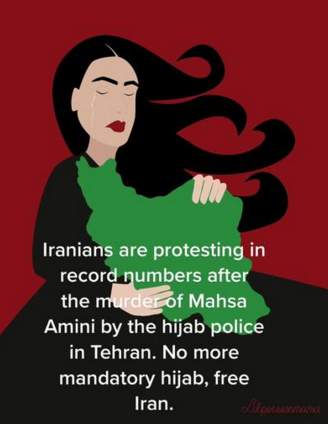
Updated September 27, 2023 |
'BIOLOGICAL
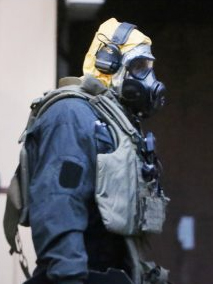
TERROR ATTACKS
AGAINST SCHOOLGIRLS'
Updated September 6, 2023 |
'IRANIAN JOURNALISTS
UNDER SIEGE'

Updated September 19, 2023 |
'BLINDING
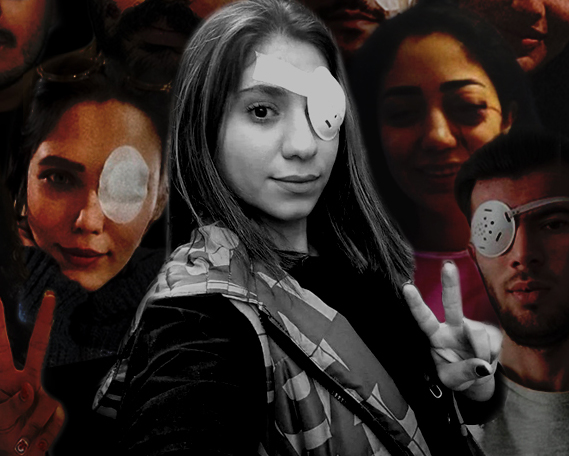
BLINDING AS A WEAPON'
Updated September 14, 2023 |
'THE HANGING SPREE'
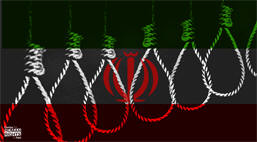
Updated September 6, 2023
|
|
|
September 27 -
25, 2023
<<No
Chewing Gum or Curly Hair: New <Code of Conduct> at
Iranian Universities...
and
<<The new academic year in Iran
sees strict clothing restrictions for female students...
and
<<Iranian Influential Women: Masih
Alinejad (1976-Present)...
and
<<Iranian University Students
Arrested, Expelled at Academic Year Start... |
below links to
September 20 - 7, 2023
Update:
September 21, 2023
<<International Community Should
Call for an End to Gender Apartheid in Iran....
Updates September 15 - 12, 2023
<<Proposed hijab penalties in
Iran: 'They can't prosecute millions of women'....
and
<<MAHSA AMINI, A YEAR ON
Iran's regime has crushed anti-veil protests, but it has
‘lost the battle’ for credibility....
September 7, 2023
<<Hijab law slammed as <gender
apartheid> by UN experts...
Click here for an overview of the
NO-hijabis protests August - April 2023
|
|
September 21 -- 20, 2023
<<International Community Should Call for an End
to Gender Apartheid in Iran....
and
<<Suppressive Hijab and Chastity Bill is Approved
by the Mullahs’ Parliament....
|
September 15 - 12, 2023
UPDATES
<<Proposed hijab
penalties in Iran: 'They can't prosecute millions of women'....
and
<<Global Trade Union Condemns Escalating <Repression> in Iran....
and
<<MAHSA AMINI, A YEAR ON
Iran's regime has crushed anti-veil protests, but it has ‘lost the
battle’ for credibility....
|
September 7 - 1, 2023
<<Iranian Engineer Who Protested Forced Hijab
Sentenced to 74 Lashes...
and
<<Iranian government uses
paramilitary groups against protesters...
and
<<'Women will not bow to the
Taliban'...
and
<<Lawyer Meets Iranian Singer Jailed
for Supporting Women's Rights...
and
<<Hijab law slammed as <gender
apartheid> by UN experts... |
A re-newed call to
partipate at the upcoming commemoration of the killing of Jina Amini:
http://www.cryfreedom.net/2022-2023-commemoration-of-Jina-Amini.htm
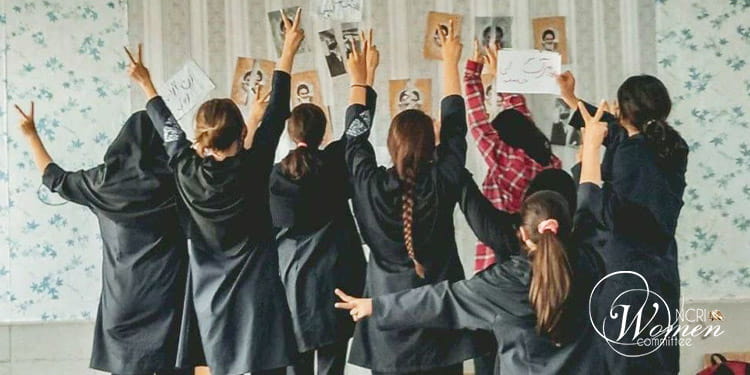
...requirement for women and girls-both teachers and students-to wear the black
head-to-toe Chador?
We say NO: Give In or Give Way!


Iranwire - September 27, 2023 - by SHOHREH MEHRNAMI
<<No Chewing Gum or Curly Hair: New <Code of Conduct> at Iranian
Universities
The release of new guidelines for the Iranian universities of
medical sciences, which include rules on how students should dress, has
sparked a flurry of reactions among local media outlets and social media
users. The Ministry of Health has recently unveiled a <code of conduct>
which students and assistants of medical sciences faculties and
universities are required to adhere to in both the academic and medical
environments. Among its provisions, the text mandates that universities
secure written commitments from students confirming their compliance
with the new regulations and keep a disciplinary record of <attire and
conduct> to gauge adherence. <Academic staff members are tasked with
assessing students and medical assistants based on their adherence to
hijab standards and clothing,> according to an article in Etemad
newspaper. <Furthermore, this policy introduces a separate evaluation
called the 'Professional Attire and Behavior Report,' which specifically
evaluates a student or medical assistant's hijab and conduct.> Social
media users brought attention to restrictions such as the prohibition of
chewing gum in medical facilities and curly hair for men, as well as a
ban on the use of cologne and cosmetics. The policy also bars women from
using nail extensions and eyelash enhancements for women.
Pursuing Social Uniformity
In an interview with IranWire, sociologist Mehrdad Darvishpour
pointed out that one of the tactics employed by totalitarian systems to
homogenize society and mold it to their preferences involves extensive
intrusion into the private lives of individuals in order to control
their personal choices and values. According to Darvishpour, the
government has not been successful in reshaping society according to its
vision, despite more than four decades of efforts to do so. <To
compensate, it is now attempting to exert control over various aspects
of life. This control extends beyond the mere issuance of guidelines in
universities, including students' compliance, the expulsion and removal
of professors and the arrest of students,> he said. <It also extends to
police intervention and invasion into personal privacy, infringing on
the smallest expressions of human dignity,> he added. In the view of
this sociologist, the government seeks to introduce in universities a
deeply religious atmosphere that is heavily influenced by the system's
totalitarian values.
Resisting the <Women, Life, Freedom> Lifestyle
Darvishpour highlighted another factor for the government's
pressure on universities, a factor rooted in the government's
decades-long struggle to purge the university of the concept of freedom.
<Today, it's evident that students not only continue to be staunch
defenders of the university's freedom but also serve as vanguards in
challenging the Islamic government's values,> he said. Darvishpour said
that the government seeks to foster a new generation of young
individuals who are unwaveringly obedient to the system by imposing
control over matters such as the hijab. Last but not least, the
government's actions can be seen as an attempt to control and suppress
the lifestyle advocated by the <Free Life Woman> protest movement, he
said.
Targeting Students and the Medical Community
Sahr Matlabi, a doctor and researcher, said that medical students
and healthcare professionals are being targeted because of their active
roles during last year's anti-government protests. <They responded to
repressive measures with peaceful, civilian participation and they
decried the use of ambulances in oppressive actions. They protested
Mahsa [Amini's] death and the chemical attacks on girls' schools,>
Matlabi said. Members of the medical and nursing communities also lent
crucial assistance to those injured in the protests. Because of their
role in the protests, a significant number of university professors have
been detained or dismissed from their positions, Matlabi emphasized.
Fueling Emigration
According to Matlabi, the government primarily seeks to push
dissenting groups to emigrate, which in the medical sector led to <a
rise in diabetes cases, an uptick in cardiovascular diseases, and a
surge in suicides, all of which collectively imperil public health.>
Matlabi also noted that the government's actions, which involve favoring
individuals with connections and lowering the quality of medical
education, have contributed to a decline in the quality of health
programs. The issuance of a code of conduct for medical students comes
at a time when university officials' actions have already led to the
humiliation and suppression of students. A female medical student
described to IranWire how students, particularly women, are often met
with derogatory comments when they enter university premises. Security
guards make remarks on their attire, question the appropriateness of
their clothing, makeup and headscarves. Female students are subjected to
degrading questions such as <Do you want men to admire your curves?> The
student explained that the constant barrage of judgments and
humiliations erodes medical students' motivation and enthusiasm for
learning. However, this is just part of the story. For instance, if
students want to eat with their classmates outside the cafeteria,
security personnel insist that they have no right to have lunch with
members of the opposite sex. Security officers also interfere when
students engage in recreational activities, like playing in the snow.
Students who resist pressures face the risk of expulsion,
suspension or legal action.
Meanwhile, professors are informed that failing to adhere to the
guidelines may impede their academic advancement and the extension of
their contracts. Consequently, many highly qualified individuals either
avoid becoming faculty members or quit their job, leading to irreparable
losses for the students' academic development.>>
Source:
https://iranwire.com/en/women/120950-no-chewing-gum-or-curly-hair-new-code-of-conduct-at-iranian-universities/
NCRI - Womens committee - September 26, 2023 - in Women's News
<<The new academic year in Iran sees strict clothing restrictions
for female students
The new academic year has seen stepped-up pressure and
restrictions on Iranian students, and more arrests and suspension of
students.
Simultaneous with the new academic year and the opening of
schools, the approval of the new Hijab and Chastity Bill into law for a
three-year trial period has created a strict atmosphere in the
universities. On Monday, September 25, social media posts showed images
of camouflaged vehicles on parade inside Tehran University and playing
anthems from the Iran-Iraq wartime.
PIC wartime vehicles
Some state-backed student councils have also posted banners
indicating the new regulations for students how to dress for school. The
councils have also sent text messages to students indicating the new
regulations. Female agents check female students' clothing at the
entrance. They warn students and allow female students only if they wear
the Maghnaeh, a head covering that covers the shoulders and the chest.
Female students are also required to wear knee-long fatigues. The Hijab
patrols also roam around the central campus and give warnings to
students. The new academic year in Iran sees strict clothing
restrictions for female students
The new moral code of Tehran University
Similar reports have emerged from Amir Kabir, Al-Zahra, Allameh
Tabatabaii, and Kharazmi universities in Tehran and Isfahan's University
of Art.
The Medical School of Kerman has also posted a banner on the
regulations for the clothing of its students. In the University of
Shiraz, they have installed facial recognition technology in the
university’s restaurants to impose more restrictions on students. The
Shiraz University management has spent 700 million Tomans to install
this technology and identify the students who breach the regulations.>>
Source:
https://women.ncr-iran.org/2023/09/26/the-new-academic-year-in-iran/
Iranwire - September 25, 2023
<<Iranian Influential Women: Masih Alinejad (1976-Present)
These years, hardly a day goes by without the name of Masih
Alinejad, a journalist and women's rights activist, appearing on social
media or on domestic and foreign media. Masoumeh (Masih) Alinejad was
born on September 11, 1976, in the village of Ghomi Kola in the northern
province of Mazandaran. Her family was extremely religious and its
female members wore the hijab, even in the confines of the home. For
Masih as a child, hijab was not just a piece of cloth on her head; it
was a symbol of all of Iran's social and religious restrictions and
represented the extreme pressure exerted on girls and women in the
country. She became politically active at an early age. In 1996, agents
of the Intelligence Ministry arrested the pregnant Alinejad, her brother
and her then husband for distributing leaflets and posting graffiti that
criticized the Islamic Republic. The Revolutionary Court tried them
without giving them access to a lawyer. Alinejad was soon released but
her brother and husband spent two and a half years in prison. <The media
wrote nothing about us,> she told IranWire. <I was thinking that a lot
of people pay the price in villages and provincial towns and the media
never talks about them. So, I decided to leave the provinces and go to
Tehran. I did not want to belong to a small student group that the
government could suppress without paying a price. And it did suppress
us. But if I worked for newspapers I could criticize more loudly. When I
joined reformist newspapers I could criticize those in power from close
up. I went to Tehran and decided that I wanted to become a journalist.>
In 2001, Alinejad began her journalism career with Hamshahri newspaper.
She contributed to many other reformist newspapers, including Shargh and
Bahar, most of which were later banned. Later, she became the
parliamentary reporter for the Iranian Labor News Agency (ILNA).
Before leaving Iran, she also reported and wrote for papers close
to reformists such as Shargh, Bahar, Ham Mihan and Etemad-e Melli. Her
style was aggressive, which did not endear her to many Islamic Republic
politicians. In 2005, she disclosed in an article that members of
parliament were being paid huge sums in New Year bonuses and supported
her claim by reproducing three of their pay stubs. This created an
uproar, and many MPs criticized her for using abusive language. After
this, she was banned from entering parliament. But Alinejad continued
her investigative journalism. In the aftermath of the disputed 2009
presidential election, while the government was denying that there had
been any violence committed against demonstrators, she was able to
document and publish the names of 57 people who were killed during the
protests. After the election, the government launched an extensive
crackdown on freedom of speech and arrested many journalists, bloggers
and people who were active on social networks. Feeling imminent danger,
Alinejad decided to leave Iran for the UK. Before leaving the country
she wrote two books including A Crown of Thorns, which was about her own
life and her expulsion from parliament as a reporter. Alinejad has since
published three other books: I am Free, which deals with women's issues
in Iran, was published in Germany because it was blacklisted by the
Ministry of Culture and Guidance; A Green Date, a novel about the
aftermath of the 2009 presidential election; and The Wind in My Hair: My
Fight for Freedom in Modern Iran, about her journey from her native
village to becoming a journalist and starting an online anti-forced
hijab movement in Iran. Leaving Iran started a new chapter in Masih
Alinejad's journalistic activities. In her early years outside Iran, she
had yet to completely remove her hijab. She was a critic of both left
and right opponents of the Islamic Republic who aimed at overthrowing
the regime and promoted boycotting elections. This, however, did not
prevent the Islamic Republic and its affiliated media outlet from
smearing and attacking her. Gradually, Alinejad turned into one of the
harshest and most active opponents of the Islamic Republic.>>
Read more here about this brave journalist:
https://iranwire.com/en/women/120868-iranian-influential-women-masih-alinejad-1976-present/

Iranwire - September 25, 2023
<<Iranian University Students Arrested, Expelled at Academic Year
Start
At last seven Iranian university students were arrested during
the first two days of the new academic year, while others were suspended
or expelled, student activist sources say. Iran's Student Union said
that the security forces apprehended Sahar Salehian, a nursing student
at Sanandaj University of Medical Sciences, in the city of Saqqez on
September 23. On the same day, the student union councils reported the
arrest of Ali Gholami, a student activist and former political secretary
of the Student Union at the University of Science and Technology. Other
students were detained as universities resumed classes: Ali Razavi of
Khawaja Nasiruddin Tousi University, Farhad Hosseini, a student in
management at Zanjan's Azad University, Mohammad Mehdi Vosoghian of
Isfahan University of Medical Sciences, and Armita Pavir of Azerbaijan
Civil University. Meanwhile, students who have been involved in or
supportive of the <Woman, Life, Freedom> movement were summoned to
university disciplinary committees and expelled or suspended.
Many of those targeted were women punished for <non-compliance
with dress code regulations.>
Sara Madadi, a cinema student at Soura University, Mustafa
Mousavi, a tourism management student at Yazd University, and Khashayar
Sefidi, a music student at the University of Arts, are among those who
were suspended. Shaghayegh Akbari, a PhD student in political sociology
and secretary of the Student Scientific Association at Tarbiat Madras
University, was excluded for 12 months.>>
Source:
https://iranwire.com/en/news/120877-iranian-university-students-arrested-expelled-at-academic-year-start/
Iranwire - September 25, 2023
<<Dental Conference in Iran Closed for Not Complying with
Mandatory Hijab
Authorities in Iran shut down a dental scientific conference in
the northeastern city of Mashhad last week because female participants
were not wearing mandatory head coverings. In a video shared on social
media, a conference organizer can be seen apologizing to the attendees
and asking them to vacate the venue. Journalist Hedieh Kimiaee reported
that police officers forcefully shut down the event and compelled all
attendees to exit the hall where it was taking place. Around 600 dental
specialists participated in the September 21 conference, including
guests from South Korea.
In recent months, the government has launched an extensive
campaign to enforce mandatory hijab regulations on Iranian women and
girls. On September 23, the police commander in northern Gilan province
announced that 1,094 businesses have been sealed across the province
over the past five months for <non-compliance with Islamic laws.> >>
Source:
https://iranwire.com/en/women/120871-dental-conference-in-iran-closed-for-not-complying-with-mandatory-hijab/
Center for Human Rights Iran
<<International Community Should Call for an End to Gender Apartheid in
Iran
September 20, 2023 - On the anniversary week of the eruption of Iran's
<Woman, Life, Freedom> movement, sparked by the killing in state custody
of a young women just three days after she was arrested for alleged
inappropriate hijab, the Iranian parliament passed a bill that
intensifies punishments against Iranian women and girls accused of
wearing inappropriate hijabs. This legislation exposes them to
heightened levels of violence. <The government of the Islamic Republic
of Iran is trampling the rights and freedoms of all women and girls in
Iran by criminalizing freedom of expression,> said Jasmin Ramsey, deputy
director of the Center for Human Rights in Iran (CHRI). <This includes
the countless brave women who continue to risk their lives in peaceful
defiance against the state's forced-hijab law by appearing unveiled in
public.> <One year after the killing in state custody of Mahsa Jina
Amini soon after she was arrested for alleged improper hijab, not one
Iranian official has been held accountable, not for her death nor the
killings of hundreds of protesters who rose up this past year,> Ramsey
said. <Instead, all women in Iran are being subjected to collective
punishment.> CHRI has issued a stark warning that the <Chastity and
Hijab Law> not only violates due process rights, denying women in Iran a
fair trial before punishment, but also exacerbates discrimination and
violence against women in the country.
Women in Iran Now Face More Violence, Discrimination
In June 2023, a woman in Tehran shared her experience of the law's
consequences with CHRI: <A few days ago, a man on the metro pushed me
hard because I wasn't wearing a hijab and I fell on the ground. Then he
dragged me....If the police hadn't arrived, the man wouldn't have left
me alone.> This new law not only places undue burdens on ordinary
citizens but also fosters vigilante violence, encouraging them to
participate in the state's enforcement of hijab regulations. Through a
system of surveillance and reporting, it also leaves women even more
susceptible to violence. Alarmingly, even before the law's official
ratification, judicial authorities have shuttered restaurants for
serving unveiled women, and women have been denied access to banks for
appearing without a hijab. These unlawful actions have occurred before
the law's ratification. Proposed in response to the growing number of
women and girls appearing in public without compulsory hijabs over the
past year, the bill passed with 152 votes in favor, 34 against, and
seven abstentions. Jasmin Ramsey, deputy director of the Center for
Human Rights in Iran (CHRI), criticized the Iranian parliament, stating,
<The parliament of the Islamic Republic has again displayed to the world
that like the old men who rule over Iran through force, they are neither
interested in nor accountable for the rights and demands of the people
of Iran. Their only aim is to maintain their power.>
Hijabless Women Deemed <Prostitutes>
The newly passed <Chastity and Hijab> bill, comprising over 70 articles,
now awaits review and approval by the state's <Guardian Council,> which
seems likely. This council, composed of six clerics and six jurists, is
headed by the 97-year-old ultra-conservative cleric, Ahmad Jannati, and
is charged with vetting all legislation to ensure it compliance with the
Islamic Republic's interpretation of Islamic law. Presently, women in
Iran can face fines, arrests, or imprisonment for not adhering to hijab
regulations. Article 638 of Iran’s Islamic Penal Code stipulates
penalties, stating,<Women who appear in public places and roads without
wearing an Islamic hijab shall be sentenced to ten days to two months'
imprisonment or a fine of 50 thousand to five hundred rials.> The human
rights lawyer Nasrin Sotoudeh was imprisoned under this law in 2019.
Moreover, women can be charged with prostitution or <promoting
prostitution> if they resist wearing the veil or advocate for a woman's
right to dress as she chooses, as outlined in Article 639. This offense
carries a punishment of one to ten years' imprisonment. The proposed
<Chastity and Hijab> bill goes even further by equating the act of
appearing in public without a hijab, whether in person or on social
media, with harm to society, deeming it equivalent to <nudity.> The bill
introduces a range of additional punishments, including fines,
restrictions on accessing bank accounts, confiscation of personal
vehicles, travel limitations, bans on online activity, and imprisonment.
Saeid Dehghan, an Iranian human rights lawyer, criticized the bill's
legality, citing a violation of Article 9 of the Constitution. This
article explicitly states that <no authority has the right to abrogate
legitimate freedoms, not even by enacting laws and regulations for that
purpose, under the pretext of preserving the independence and
territorial integrity of the country.>
Dehghan further emphasized the bill's problematic nature by highlighting
the lack of clear definitions for key terms such as <violations of
social norms” and <hijab.> This absence of clarity not only opens
avenues for manipulation and misuse of the law but also increases the
risk of citizens' rights being infringed upon due to the ambiguity.
Global Action Required to Unite Against Gender Apartheid in Iran
UN human rights experts have strongly denounced the Islamic Republic's
practice of <criminalizing the act of refusing to wear a hijab,>
asserting that it constitutes a clear violation of women and girls'
freedom of expression. They emphasize that this violation can lead to
potential infringements on other fundamental rights, spanning political,
civil, cultural, and economic domains. Simultaneously, women's rights
activists launched a campaign in March 2023 aimed at securing formal
recognition of gender apartheid as a crime under international law. The
campaign's ultimate objective is to dismantle the structures
perpetuating gender-based discrimination and inequality in the Islamic
Republic of Iran and under the Taliban regime in Afghanistan. Despite
facing immense adversity, Iranian women continue their peaceful defiance
against the hijab law, even within the confines of prison. Prominent
human rights advocate Narges Mohammadi, from inside Iran's Evin Prison,
recently published a letter in the New York Times. In it, she wrote,
<The regime seems to be purposefully propagating a culture of violence
against women. We are fueled by a will to survive, whether we are inside
prison or outside. The government's violent and brutal repression may
sometimes keep people from the streets, but our struggle will continue
until the day when light takes over darkness and the sun of freedom
embraces the Iranian people.> During his address to the UN General
Assembly in New York, Iranian President Ebrahim Raisi faced condemnation
from UN human rights experts for his government's violent repression of
protests. They expressed ongoing concerns about the policies and
practices in Iran, which, they argued, result in total impunity for
grave crimes committed under international law in the year following
Mahsa Jina Amini's killing. <The Government of the Islamic Republic of
Iran could have learned important lessons from the tragic death of Jina
Mahsa Amini. But its response to the demonstrations that have led to the
deaths of hundreds of protestors since September 2022 shows that
authorities have chosen not to,> they stated. CHRI urges the
international community to urgently call for the repeal of the state's
forced-hijab law and to demand and end the systemic repression and
gender-based discrimination against women in Iran that it represents.
<The hijab should be a choice, not a tool of state repression. Iranian
women's courageous stance against this government of old men deserves
international support,> said Ramsey.>>
Source:
https://iranhumanrights.org/2023/09/irans-parliament-approves-harsh-new-hijab-law-escalating-repression-of-women-majles/

Wartime vehicles at Tehran university
NCRI - Womens committee - September 21, 2023 - in Women's News
<<Suppressive Hijab and Chastity Bill is Approved by the Mullahs’
Parliament
The clerical regime's parliament adopted the controversial and
suppressive Hijab and Chastity Bill in an open session on Wednesday,
September 20, 2023.Mohammad Baqer Qalibaf, the speaker of the mullahs'
parliament, said the bill had been ratified in coordination with the
Iranian Judiciary. The Judicial Branch declared its agreement in writing
to the parliament. One hundred and fifty-two (152) members of the
parliament voted in favor, 34 against, and seven abstained. The new
suppressive Hijab and Chastity Bill will be enforced for three years on
a trial basis after being approved by the Guardian Council. A group of
UN Human Rights Council-appointed experts slammed the suppressive Hijab
and Chastity Bill in a statement on September 1, and said it could
amount to <Gender Apartheid.> The experts urged the Iranian authorities
to <reconsider the compulsory hijab legislation in compliance with
international human rights law, and to ensure the full enjoyment of
human rights for all women and girls in Iran.>
Suppressive Hijab and Chastity Bill is Approved by the Mullahs'
Parliament
Moussa Ghazanfarabadi, a mullah and the chair of the parliament's Legal
Commission, told the open session: <The bill submitted to the parliament
by the government and through the Judiciary contained 15 articles. It
did not consider cultural issues. Some 35 articles were included which
deal with cultural issues and predict the obligations of the executive
apparatus in culture building and confronting the enemy's psychological
war.>
Ghazanfarabadi explained, <The bill has five chapters. The first chapter
deals with generalities; the second chapter defines the general duties
of executive organs. The third chapter defines the special obligations
of executive agencies like the national radio and television and the
Ministry of Culture and Islamic Guidance. The fourth chapter outlines
the general duties and social responsibilities, and the fifth chapter
outlines the crimes and offenses. All agencies are obliged to follow up
the offenses and file cases with the Judiciary.> Fearing public
reactions, the clerical regime's parliament refrained from debating the
bill in its open session and invoked an article of the constitution that
permits the formation of a committee to approve legislation for
<experimental> implementation.>>
Source:
https://women.ncr-iran.org/2023/09/21/suppressive-hijab-and-chastity-bill/
Womens'
Liberation Front 2019/cryfreedom.net 2023













